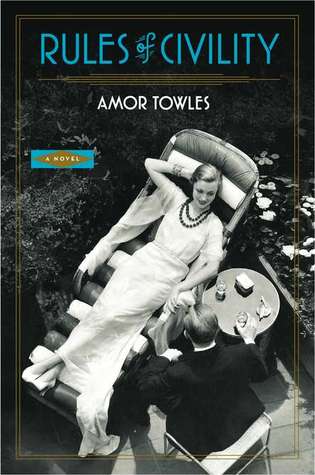A few chapters in, I didn't think I was going to like the book at all and was feeling very happy I hadn't sprung for a copy back when it was new. Katey Kontent, apart from the dumb name, is one of those annoying self-effacing cyphers of a narrator who barely seems like a character in her own story. At first, I thought she was going to be a Nick Carraway, a character so bland and colorless that I barely remembered The Great Gatsby was written in first person, despite my affection for the novel. (When the Leo DiCaprio version came out, I was at first flummoxed by the news that Tobey Maguire was playing Nick, since I didn't remember Nick even existing.)
It turns out that Katey's just a bit introverted and stoic. Clear away some of the characters that overshadow her, and she turns out to have a few ideas and emotions of her own, if she does tend to be a bit of a martyr. Civility reminds me of Gatsby in some other ways, however, that are more thematic. It's a bit about reinvention, a bit about the second-generation immigrant experience, and a lot about parties with the rich and beautiful. Frankly, if you took the dates out of the book, I would have identified the setting as the 1920s; however, the actual setting is the late 1930s, which strikes me as odd. The tropes tell us that the Twenties were about frivolity and wealth and irresponsibility, while the Depression was about desperation, poverty, and despair, but the action of this book involves Katey (poor-ish but never in want for a meal or a roof over her head) going from club to fancy restaurant to country-house party with a wealthy crowd of carefree young people with trust funds. I'm not going to say it's wrong for the era, but it's certainly not the received wisdom.
The early turning point of the story, and the action which drives the main characters for the rest of the narrative, is a car accident. Oddly, while it is clearly depicted in the text as being the fault of a milk van, everyone in the book acts as if the main character who was driving the car that was struck is completely responsible, both morally and financially. Was there no auto insurance in 1938? Could not the milk company have been sued or the negligent driver arrested? My guess is that, in an earlier draft, the main character was at fault and the author chose to soften the fact in revision, for fear that a drunk driver wouldn't retain the reader's sympathy.
The greatest misstep of the book, in my opinion, is the character of Eve Ross, and I didn't really begin to enjoy the book until she had departed the action. The author is clearly besotted and presents her as someone we're supposed to like and admire, but her actions are thoroughly selfish and manipulative. She keeps swearing her undying devotion and unending friendship to the narrator, a protestation that never once results in her acting in any way that shows the slightest bit of regard for Katey's well-being. Perhaps the worst part is when the gold-digging Eve allows working-girl Katey to pay for champagne on Eve's birthday, promises to return the favor on Katey's birthday, then instead ditches her to go to Europe with a man she knows Katey is a bit in love with. Towles seems to think that everyone finds this sort of behavior forgivable if not flat-out endearing. Unfortunately, he has written a sequel that is "all about Eve" after her plot-line thankfully diverges from the narrative.
If Katey never quite manages to ring true and her background remains frustratingly un-pinned-down, Wallace Wolcott is the best character in the novel. Much like Katey, he appears bland and uninteresting when he is introduced, overshadowed like her by Eve and Tinker Grey, but his serendipitous reappearance reveals a charming and fully-realized personality. He disappears from the narrative yet again afterward, but he has a final unexpected coda which provides one of the few unambiguously heartwarming moments in the story.

No comments:
Post a Comment